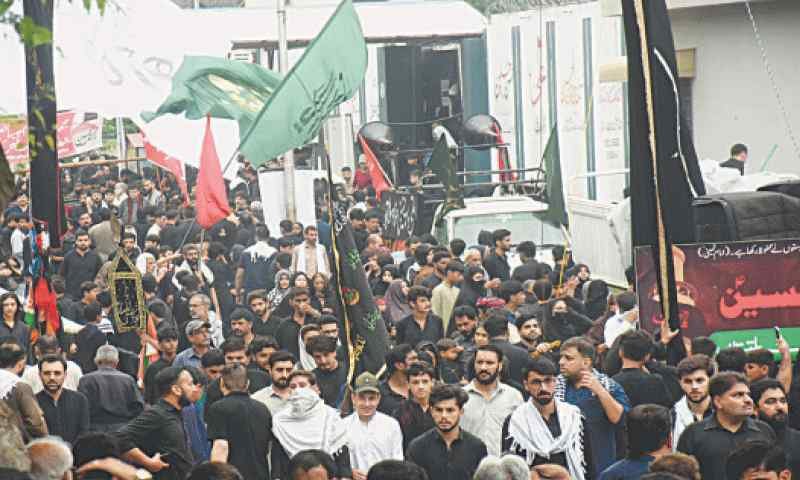The Chehlum of Hazrat Imam Hussain (AS) and his companions was observed in Rawalpindi on Friday with thousands of mourners joining traditional processions that concluded without incident under heavy security.
Processions Across the City
Three main processions set out from Imambargah Aashiq Hussain in Teli Mohalla, Imambargah Hifazat Ali Shah, and Imambargah Col. Maqbool Hussain. Zuljanah processions from Tyre Bazaar and Mohallah Darbar Sakhi Shah Chan Charagh later merged with the central procession, which ended at the historic central Imambargah.
Religious groups including Mukhtar Students Organisation, Mukhtar Generation, Ibrahim Scouts, and the Muharram Committee coordinated with police and local authorities to manage the processions. Members of Tehreek Nafaze Fiqhe Jafariya (TNFJ) remained present throughout.
Security on High Alert
City authorities deployed several thousand police personnel, along with bomb disposal squads, Rescue 1122 teams, and hospital ambulances, to secure the routes. Streets connected to the main procession path were sealed with barricades, while patrol units monitored adjoining areas. Despite the large crowds and strict checks, officials confirmed that the day passed peacefully without any security incident.
Sermons Emphasize Karbala’s Legacy
Ulema and scholars addressing the gatherings reflected on the sacrifices of the martyrs of Karbala, drawing particularly on the words of Hazrat Bibi Zainab (SA) after the tragedy. They urged Muslims to embody Imam Hussain’s (AS) spirit of resistance and sacrifice in the face of oppression.
At Fowara Chowk, the procession transitioned into a Majlis where Allama Qamar Zaidi spoke about the suffering of the Prophet’s family after Karbala. The gathering concluded with matam and zanjeer zani rituals.
TNFJ Leader Criticizes Travel Ban
Speaking to the media, TNFJ chief Allama Agha Syed Hussain Muqaddasi stressed that Imam Hussain’s message transcends sectarian boundaries. He criticized the government’s ban on travel along the Quetta–Taftan route for pilgrims, calling it unjust and unnecessary given the country’s security resources.
“This ban undermines the dignity of Pakistan. Instead of restricting pilgrims, the state should focus on defeating terrorists,” he said, reiterating demands for the revival of the Quetta–Zahidan rail service and alternative routes for Ziyarat.
On national policy, Muqaddasi argued that Pakistan’s problem lies not in a shortage of laws but in their weak enforcement. He said that fully implementing the National Action Plan remains essential to counter extremism.
Condemnation of Israeli Actions
Allama Muqaddasi also condemned Israel’s ongoing assault on Gaza, describing it as part of a wider agenda targeting Muslim nations. He accused Israel of war crimes, including the targeting of journalists, and criticized the silence of the Muslim world in response.
Unity and Tribute
Before dispersal, Muqaddasi praised Pakistan’s security forces and lauded the cooperation among different schools of thought during the Arbaeen commemorations. The peaceful conclusion of the Chehlum processions, he said, reflected the resilience and unity of the community.

